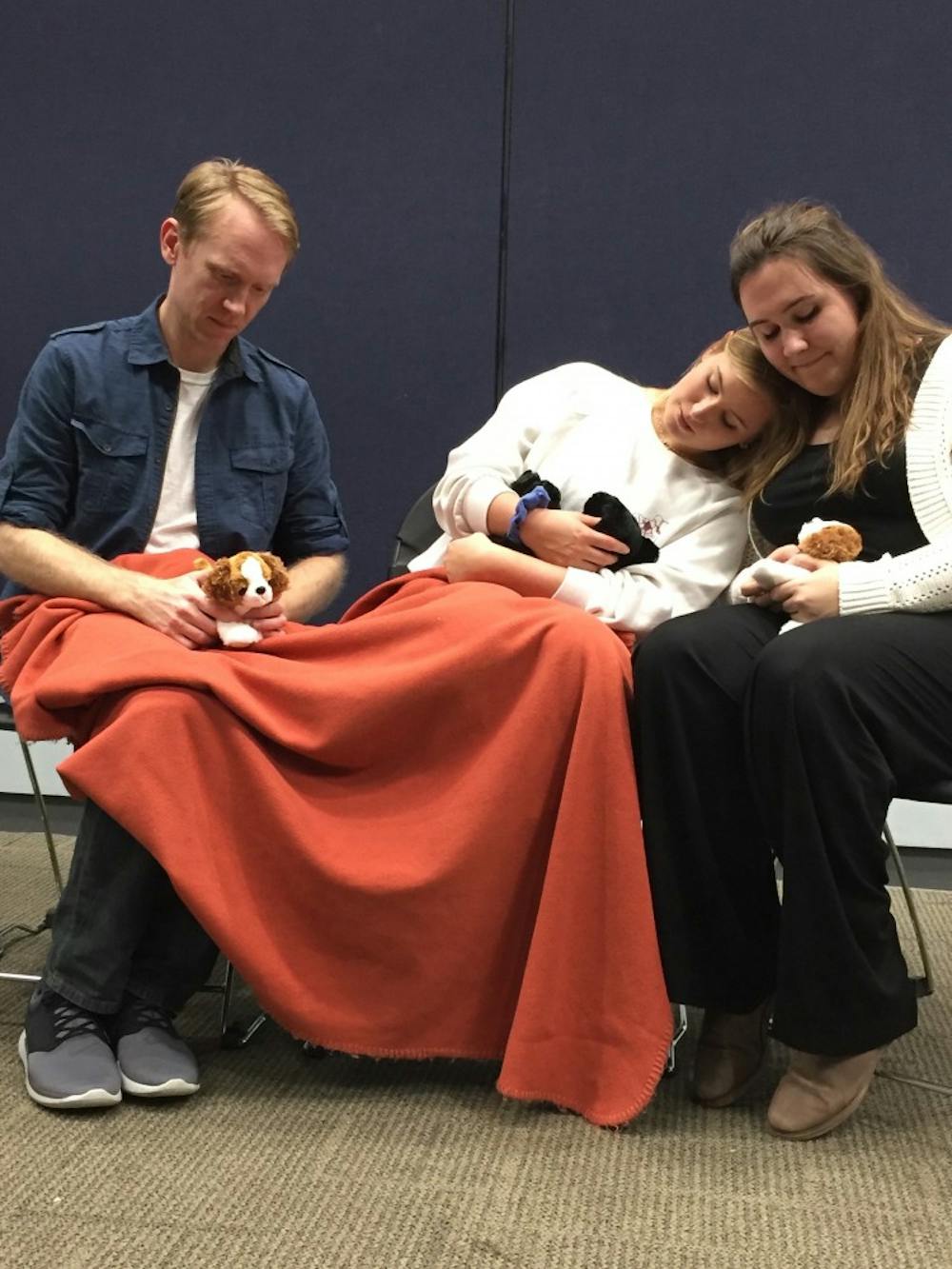At first, the theatre in which Black Dog takes place, at the Charm City Fringe Theatre Festival in downtown Baltimore, doesn’t look like much. It’s more of an art gallery than a theatre, and the only furniture on the stage, if you can even call the area marked off by black curtains a stage, is a collection of IKEA patio furniture. But any thoughts I had about how minimal and bare the stage looked were all forgotten as soon as the actors took to the stage, in a play that was so viscerally, devastatingly real that the audience sat stunned in their chairs for minutes after the actors had left the stage.
It’s hard to write tragedy, even harder to write comedy and, hardest of all, to write realistic scenes; to have comic moments within tragedy and somber moments in lighthearted scenes. Black Dog achieves this: It feels unscripted in its realism.
The play, written by Rachel Linton and produced by Hopkins seniors Sarah Linton and Julia Zimmerman, follows a young couple — Angelica (Christina Hastings) and Max (William Goblirsch), along with Angelica’s younger sister and Max’s best friend, Lucy (Hopkins alum Elizabeth Winkelhoff), as they care for newborn puppies that may not survive the night. Although the writing takes a few moments to establish setting and character, the actors spring to life as their characters without a moment’s doubt. Through this, it becomes obvious that there is something unspoken between them.
“You’re really, really okay?” Lucy asks. The response Max gives — “I mean.” — is the first clue to the audience that something is wrong. Slowly but surely, we learn that Max is dying. As the night goes on and two of the dogs die, the cast grapples with premature grief and impending death — an unstoppable train, to use Max’s metaphor. For Rachel Linton, the story as a whole was an attempt to confront the unstoppable inevitability of death and how to deal with grief before it happens. The puppies that Angelica rescued create a physical parallel acted out on stage that isn’t overdone or endlessly hopeless.
Toward the end of the play, Angelica asks her husband, “What am I gonna do without you?” It’s the central question of the play, finally voiced out loud. Max tries to provide answers, but there is silence between his words. At the end of the day, that question doesn’t have an easy answer, and Rachel Linton’s writing allows these feelings of grief to exist in all their complexities.
The writing is powerful on its own, but the life that Hastings, Goblirsch and Winkelhoff breathe into their characters gives the show its power. Their relationships are palpable and real, and the intimacy of the space made it feel very much like I was sitting in their living room instead of watching a play.
But I didn’t feel like an intruder. Instead, I felt a sense of catharsis — a relief in the realization that grief is universal. This was something that Sarah Linton said they strived to achieve with the play.
“This story was emotionally resonant because everybody is going to deal with things in their life that they cannot control... I wanted the audience to be confronted with that but also comforted that you are not alone in that,” she said.
Part of what gives this play its uniqueness is its ability to hit home with audience members of many backgrounds. A number of Hopkins friends that I went to the show with were even moved to tears. However, while the show clearly has a powerful impact on the audience, it has struggled to find a home in theatre festivals — it is either too long (with a run time of about half an hour) or too dark for the target audience.
This is the first time it is being produced, and how fitting that this show, made possible through an Andrew W. Mellon Foundation grant, has found a home in the intersection of theatre in Baltimore and theatre at Hopkins.
Many of the cast and crew involved in the production were either Hopkins students or alumni. In addition to the producers, who are current seniors, the production was directed by Gillian Lelchuk, stage managed by Esther Rodriguez and technically directed by Ryan Kunzer, all recent Hopkins alumni. Hastings commented on her experience working with Hopkins students.
“[It] was a joy, because they all already knew each other, which is a comfortable environment to get into because everyone was so welcoming,” she said.
This play reminded me of how powerful theatre can be: It invoked the power of theatre to share stories, to live in the stories of others and to, for a brief moment, understand that you are not alone. I can’t remember the last time I saw a show that moved me as much as Black Dog did.





